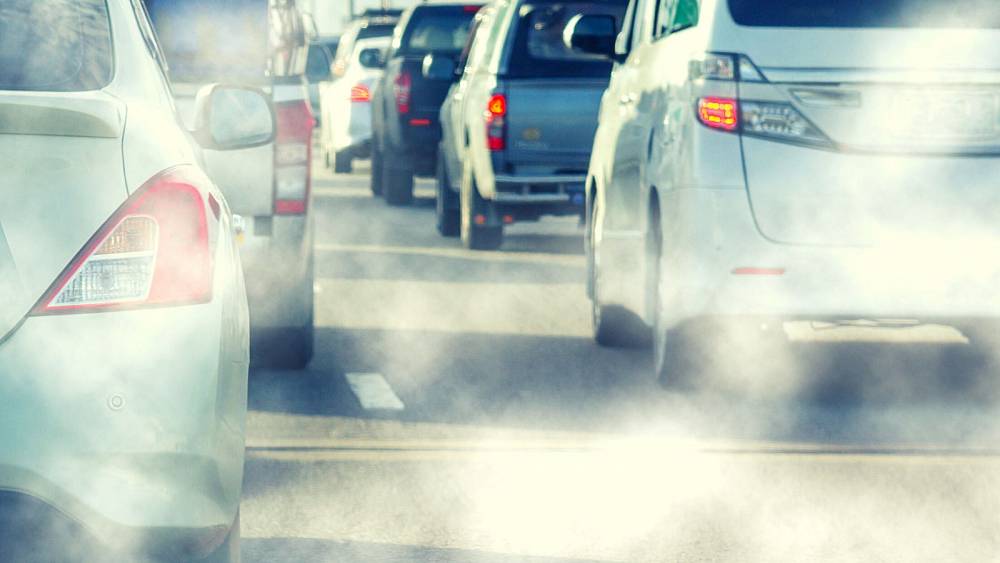British scientists say they’ve finally figured out how air pollution can trigger lung cancer in non-smokers, unveiling new research that could boost cancer prevention and early detection.
Their results show how tiny particles produced by internal combustion engine vehicles promote the growth of lung cells harboring cancer-causing mutations.
The research helps explain why so many non-smokers develop lung cancer – and could provide clues to prevent them from developing such tumours.
The findings, which have not yet been published in a peer-reviewed journal, were presented at the European Society for Medical Oncology annual conference in Paris on Saturday.
“Cells with cancer-causing mutations naturally accumulate with age, but are usually dormant. We have shown that air pollution wakes up these cells in the lungs, stimulating them to grow and possibly form tumours,” said Professor Charles Swanton, who led the study at the Francis Crick Institute and at University College London (UCL).
“The mechanism we identified could ultimately help us find better ways to prevent and treat lung cancer in non-smokers. If we can stop cell growth in response to air pollution, we can reduce the risk of lung cancer.”
The scientists also found higher rates of other types of cancer in areas with high levels of particulate matter.
They speculate that air pollution could encourage the growth of cells that carry cancer-causing mutations elsewhere in the body – and thus trigger the early stages of many different types of cancer.
The research was funded by Cancer Research UK as part of a broader effort to understand how lung cancer develops and develops in hopes of finding new treatments for the disease.
A “trigger” for dormant cells
Smoking remains the leading cause of lung cancer, but in 2019 approximately 300,000 deaths were attributed to lung cancer worldwide Exposure to PM2.5 – tiny particles in car exhaust.
Air pollution is linked to a variety of other health problems, including asthma, chronic obstructive pulmonary disease (COPD), heart disease and dementia. How it causes cancer in people who have never smoked has long been a mystery.
The British scientists were trying to test a theory: that PM2.5 particles cause inflammation in the lungs and “wake up” normally dormant cells that carry cancer-causing mutations, causing them to go out of control and form tumours.
The team studied a specific type of lung cancer, mutant epidermal growth factor receptor (EGFR) lung cancer. Mutations in the EGFR gene are commonly found in lung cancer in people who have never smoked.
Researchers looked at data from over 400,000 people in England, South Korea and Taiwan and compared rates of EGFR-mutated lung cancer in areas with different levels of PM2.5 pollution.
In fact, they found higher rates of EGFR-mutated lung cancer — as well as higher rates of other types of cancer — in people living in areas with higher levels of air pollution.
In a lab, the team then exposed mice with lung cells carrying EGFR mutations to levels of air pollution typically found in cities.
They found that these mice were more likely to develop cancer than those not exposed to air pollution.
prevent cancer
Interestingly, the researchers found that blocking a molecule called IL-1β (interleukin-1β) — which normally causes inflammation and is released in response to PM2.5 exposure — prevented the development of cancer in these mice.
“Finding ways to block or reduce inflammation caused by air pollution would go a long way in reducing the risk of lung cancer in people who have never smoked,” said Dr. William Hill, a postdoctoral fellow at the Francis Crick Institute, the co-first author.
Tony Mok, a professor at the Chinese University of Hong Kong who was not involved in the research, called the results “intriguing and exciting”.
“This means we can ask ourselves if in the future it will be possible to use lung scans to look for pre-cancerous lesions in the lungs and try to reverse them with drugs like interleukin-1β inhibitors,” he said in an opinion.
The future will tell if using EGFR profiles could help identify non-smokers who may be predisposed to lung cancer, he added.
The team behind the new study say that reducing people’s overall exposure to air pollution is urgent for now.
“The risk of lung cancer from air pollution is lower than from smoking, but we don’t have control over what we all breathe,” Swanton said.
#Air #pollution #trigger #lung #cancer #nonsmokers


Leave a Comment